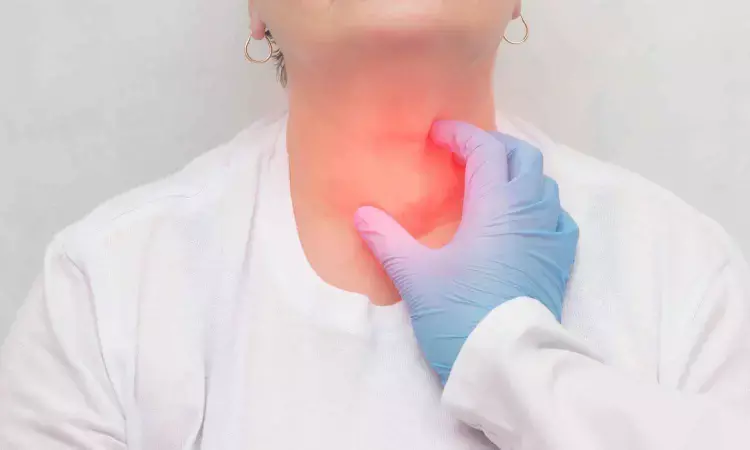- Home
- Medical news & Guidelines
- Anesthesiology
- Cardiology and CTVS
- Critical Care
- Dentistry
- Dermatology
- Diabetes and Endocrinology
- ENT
- Gastroenterology
- Medicine
- Nephrology
- Neurology
- Obstretics-Gynaecology
- Oncology
- Ophthalmology
- Orthopaedics
- Pediatrics-Neonatology
- Psychiatry
- Pulmonology
- Radiology
- Surgery
- Urology
- Laboratory Medicine
- Diet
- Nursing
- Paramedical
- Physiotherapy
- Health news
- Fact Check
- Bone Health Fact Check
- Brain Health Fact Check
- Cancer Related Fact Check
- Child Care Fact Check
- Dental and oral health fact check
- Diabetes and metabolic health fact check
- Diet and Nutrition Fact Check
- Eye and ENT Care Fact Check
- Fitness fact check
- Gut health fact check
- Heart health fact check
- Kidney health fact check
- Medical education fact check
- Men's health fact check
- Respiratory fact check
- Skin and hair care fact check
- Vaccine and Immunization fact check
- Women's health fact check
- AYUSH
- State News
- Andaman and Nicobar Islands
- Andhra Pradesh
- Arunachal Pradesh
- Assam
- Bihar
- Chandigarh
- Chattisgarh
- Dadra and Nagar Haveli
- Daman and Diu
- Delhi
- Goa
- Gujarat
- Haryana
- Himachal Pradesh
- Jammu & Kashmir
- Jharkhand
- Karnataka
- Kerala
- Ladakh
- Lakshadweep
- Madhya Pradesh
- Maharashtra
- Manipur
- Meghalaya
- Mizoram
- Nagaland
- Odisha
- Puducherry
- Punjab
- Rajasthan
- Sikkim
- Tamil Nadu
- Telangana
- Tripura
- Uttar Pradesh
- Uttrakhand
- West Bengal
- Medical Education
- Industry
Thyroid Dysfunction Common After Radiotherapy in Head and Neck Cancer Patients, Study Warns

Brazil: A recent study published in Head & Neck highlights the increased risk of thyroid dysfunction in patients with head and neck squamous cell carcinoma (HNSCC) following external radiotherapy (RT). The study found that more than half (54.7%) of HNSCC patients who underwent RT developed thyroid dysfunction (TD), with 53.7% experiencing long-term complications.
"Subclinical hypothyroidism emerged as the most prevalent form, progressing to overt hypothyroidism in 21% of cases. The risk of TD was notably higher in patients with type 2 diabetes mellitus (T2DM), metastatic lymph node involvement, and those who did not undergo tumor resection, highlighting the importance of regular thyroid monitoring after RT," the researchers reported.
Radiotherapy, a cornerstone in the management of HNSCC, is known to impact the thyroid gland due to its anatomical proximity to the treatment field. Hypothyroidism remains one of the most common adverse effects, often manifesting months or even years after therapy. Considering this, Denise Engelbrecht Zantut-Wittmann, Department of Internal Medicine, School of Medical Sciences, Endocrinology Division, University of Campinas, São Paulo, Brazil, and colleagues aimed to assess thyroid dysfunction in patients with head and neck squamous cell carcinoma undergoing external radiotherapy.
For this purpose, the researchers examined early and long-term thyroid dysfunction in 285 patients with head and neck squamous cell carcinoma who received radiotherapy either alone or in combination with radiochemotherapy and/or surgery.
The study led to the following findings:
- 156 patients (54.7%) experienced thyroid dysfunction (TD) during follow-up, with 153 patients (53.7%) experiencing long-term TD.
- Subclinical hypothyroidism (SCH) was the first detected TD in 43.5% of cases.
- Among those with SCH, 68.5% had persistent SCH, 21% progressed to overt hypothyroidism, 0.8% developed central hypothyroidism, and 9.7% returned to euthyroidism.
- The average time to first TD detection was 7.2 months after radiotherapy (RT).
- Subclinical thyrotoxicosis was identified at an average of 3.85 months post-RT, while SCH was detected at 17.77 months.
- Risk factors for TD included type 2 diabetes mellitus (DM2), metastatic lymph node involvement, and the absence of tumor resection.
- All patients with thyroid-stimulating hormone (TSH) levels ≥7.5 mIU/mL developed primary hypothyroidism or SCH.
- At long-term follow-up, 19.5% of patients with TSH levels <7.5 mIU/mL remained euthyroid.
The authors emphasize the importance of regular thyroid function monitoring in patients with head and neck squamous cell carcinoma after radiotherapy, particularly those with type 2 diabetes mellitus, metastatic lymph node involvement, or lack of surgical tumor resection.
They concluded that the high incidence of thyroid dysfunction in these patients necessitates early detection through routine assessments, enabling timely intervention and reducing the risk of complications associated with hypothyroidism. They noted that integrating thyroid monitoring into post-treatment care protocols could significantly enhance long-term outcomes and improve the quality of life for HNSCC survivors.
Reference:
Fiore, A. R., Lourenço, G. J., Pereira, E. B., Passos Lima, C. S., & Zantut-Wittmann, D. E. Early and Long-Term Thyroid Dysfunction in Patients With Head and Neck Squamous Cell Carcinoma After External Radiotherapy: Clinicopathological Risk Factors. Head & Neck. https://doi.org/10.1002/hed.28150
Dr Kamal Kant Kohli-MBBS, DTCD- a chest specialist with more than 30 years of practice and a flair for writing clinical articles, Dr Kamal Kant Kohli joined Medical Dialogues as a Chief Editor of Medical News. Besides writing articles, as an editor, he proofreads and verifies all the medical content published on Medical Dialogues including those coming from journals, studies,medical conferences,guidelines etc. Email: drkohli@medicaldialogues.in. Contact no. 011-43720751


